For over a decade the David Sheldrick Wildlife Trust’s Community Outreach Programs have been vital in building sustainable relationships with the local communities bordering Kenya’s National Parks and wildlife protected areas
For over a decade the David Sheldrick Wildlife Trust’s Community Outreach Programs have been vital in building sustainable relationships with the local communities bordering Kenya’s National Parks and wildlife protected areas. These successful programs strive to improve living conditions and educational standards, encouraging communities and the next generation to protect their wildlife and environment. So far this year the DSWT has engaged in the following activities:
Tree Planting Campaigns For nearly 15 years the Trust has been donating tree saplings to the local schools and communities bordering the Tsavo Conservation Area. This rehabilitation program encourages children and adults to plant, nurture and protect their trees, giving them a sense of ownership and pride, whilst educating them about the importance of trees and forests, and the vital role they play within the environment. During the long-rains, which started in late March 2013 and lasted until mid-May 2013, the DSWT donated a total of 700 Neem seedlings (Azadirachta indica) to different community groups, dispensaries and schools. The Neem Tree, which in Kiswahili is called "Muarubaini", meaning the tree of the forty cures, is one of the trees grown that can survive the extremely harsh conditions of Tsavo. The tree, having been introduced to Eastern Africa during the 19th century by East Indian immigrants, produces much needed shade and timber whilst also producing seeds, leaves and bark which can be used for medical and insecticidal purposes.
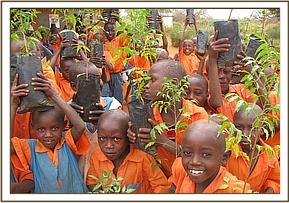

School Field Trips and Educational Support A huge number of Kenyan children have never seen an elephant before or even the most common of wildlife species due to the associated costs of visiting National Parks in Kenya. For this reason the DSWT arranges free field trips into Tsavo East and West National Parks, encouraging children to form Wildlife Clubs and embrace their wildlife and environment. From the Mtito, Kibwezi and Voi areas within the greater Tsavo Conservation Area, the DSWT Community Outreach program has taken a total of 14 schools, totalling 350 children and 42 teachers from each school on a full day’s conservation trip during the year so far. Schools from the Kibwezi and Mtito area were taken to Tsavo West National Park where they visited the Tsavo West Education Centre, Shetani Lava, Mzima Springs, Chaimu, Rhino Valley and Rhino Valley Game Lodge. Schools from the Voi area were taken to Tsavo East National Park where they visited the Tsavo East Education Centre, Kanderi swamp, the DSWT Voi Elephant stockades and the Mudanda Rock site.
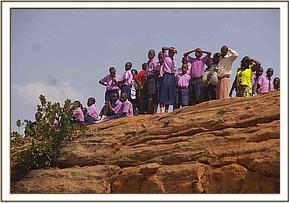

The DSWT has also been supporting the local schools with desk donations, as even a desk is a rare resource for the impoverished schools bordering Tsavo. These long-lasting desks are handmade by local craftsmen utilising reclaimed wood and sustainable materials. This year over one hundred desks have been generously donated to the schools through the DSWT with the support from various organisations and individuals. The same has been achieved with the donations of sports equipment, a luxury not afforded by any of the schools the DSWT teams work with. Educational film shows are another aspect of the work of the DSWT’s Community Outreach Program, which allows hundreds of children to engage in environmental education through carefully selected films available in Kiswahili.
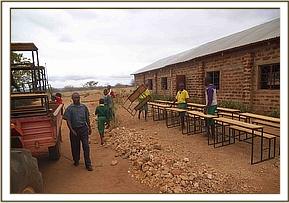
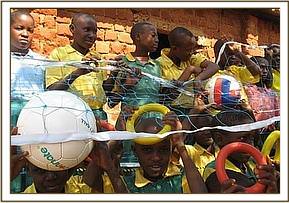
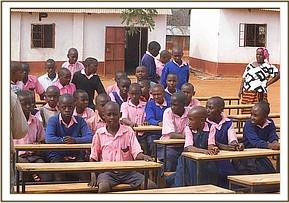

Human Wildlife Conflict Resolution With the growing human population next to the Park’s boundaries, competition for water and other resources have put human and wildlife into conflict. The majority of reports received this year include the larger herbivores (elephants and buffalo) and the carnivores (lions, leopards, and hyenas), which are responsible for the majority of human-wildlife conflicts. The DSWT has been working closely with the Mtito-Andei Human-Wildlife Conflict Resolution Self-Help group, which is formed of over 100 members, to come up with the best ways to help control the conflict along the Mtito River, ensuring both the communities and the wildlife are safe and protected from each other.
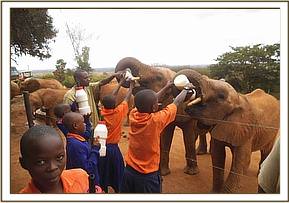

Anyone can support the DSWT's Community Outreach programs by going onto our website and donating at https://www.sheldrickwildlifetrust.org/is/donate_now.asp by selecting 'Community Outreach' from the dropdown menu.